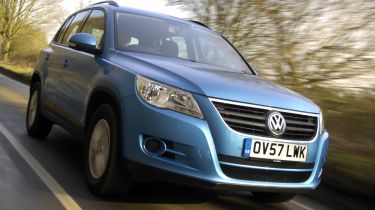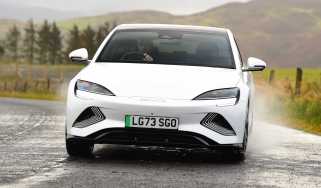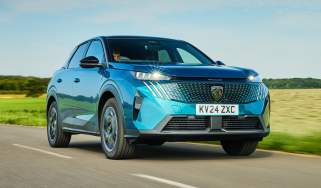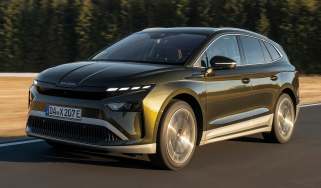Volkswagen Tiguan
Has the new Tiguan got what it takes to topple the impressive Freelander?

THE Tiguan is a classy addition to the compact SUV class. Its small dimensions, frugal engines and five-star Euro NCAP rating make it a credible alternative to a mainstream hatch. More powerful petrol and diesel engines are also in the pipeline, which will boost its appeal even further. However, hi-tech features such as Park Assist and touchscreen sat-nav push up the price, and with the entry-level diesel starting at £20,500, it can start to look expensive.
Car makers are tripping over themselves to build small off-roaders, but Volkswagen is ahead of the game.
The Tiguan is the firm’s first-ever compact SUV, and it has stolen a march on forthcoming rivals such as the Ford Kuga and Renault Koleos, as it’s on sale now. But is it worth a trip to your local VW showroom?
Well, plenty of thought has gone into the Tiguan’s styling. Its compact exterior dimensions will appeal to hatchback drivers, and there’s nothing intimidating about its neat headlamps and squared-off wheelarches.
Protective mouldings are fitted to the sills and door bottoms, and all models, even this entry-level S version, come with smart alloy wheels. Climb aboard, and the cabin is exactly what we’ve come to expect from VW, with high-grade materials and solid build quality. Four pairs of stylish circular air vents punctuate the dashboard, and the driving position is commanding and comfortable, with plenty of adjustment from both the seat and steering wheel.
Space on the centre console is freed up by a Passat-style electronic parking brake. It’s less intuitive to use than a conventional handbrake, but it has a useful auto-hold function to help when pulling away on steep inclines.
Despite its compact exterior dimensions – the Tiguan is 33cm shorter than a Passat – there’s plenty of space inside, and a 395-litre boot. The split-folding rear seats also slide to optimise luggage space or legroom. Fold them completely flat, and there’s 1,510 litres of luggage space.
Go for SE trim and you’ll get front foglights, bigger alloys, plus chrome roof rails and window trims. Inside, the upgrade adds an improved six-disc CD changer and practical touches such as rear picnic tables, but you pay £1,300 for the privilege.
Our test car was fitted with VW’s new touchscreen sat-nav system. The package includes a rear view camera to help when reversing, a CD changer in the front armrest, music hard drive and an MP3 player connection. It’s easy to use and looks great, but at £2,080, it’s expensive.
Other hi-tech extras include Parking Assist, which actually steers the car into a space, and a panoramic sunroof – but they cost £795 and £450 respectively. If you plan to take your Tiguan off-road, there’s Escape trim, which features a revised front bumper with an improved approach angle and hill descent control.
Two engine options are available at launch, but the line-up will expand later this year. For now buyers can choose between the firm’s turbo and supercharged 148bhp 1.4-litre TSI petrol or a 138bhp 2.0-litre TDI diesel. The oil-burner will take the majority of sales, thanks to punchy performance and fuel economy of up to 39.2mpg. The impressive returns are partly due to the clever 4MOTION four-wheel-drive system, which only engages the rear wheels when needed. It provides decent ability in the rough, but few owners are likely to leave the tarmac.
On the road, the Tiguan is agile, composed and refined, with precise steering. Performance is brisk, with the 0-62mph sprint taking 10.5 seconds, but CO2 emissions of 189g/km put the diesel in road tax Band F. Thanks to its tall body there’s some roll in the bends and dive under braking, but it’s well controlled and doesn’t spoil the comfortable ride. Later this year, two more powerful 2.0-litre TSI petrol engines and a 168bhp 2.0-litre diesel will join the range.
By then the Tiguan will have even more competition, but VW has set a high benchmark for new arrivals in the competitive compact SUV class.







